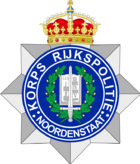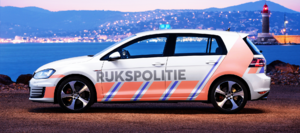National Police Corps (Noordenstaat)
This article is incomplete because it is pending further input from participants, or it is a work-in-progress by one author. Please comment on this article's talk page to share your input, comments and questions. Note: To contribute to this article, you may need to seek help from the author(s) of this page. |
| National Police Corps Korps Rijkspolitie | |
|---|---|
Rijkspolitie logo | |
 Rijkspolitie badge | |
| Common name | Rijkspolitie |
| Abbreviation | NSPOL |
| Agency overview | |
| Formed | 1921 |
| Preceding agency |
|
| Jurisdictional structure | |
| National agency | Noordenstaat |
| Operations jurisdiction | Noordenstaat |
| Size | 1,149,700 km2 |
| Population | 127,224,534 |
| Governing body | Ministry of Justice and National Security |
| General nature | |
| Operational structure | |
| Headquarters | Koninstad, Noordenstaat |
| Officers | 260,500 |
| Civilians | 20,000 |
| Departments | 10
|
| Regions | 12 |
| Facilities | |
| Stations | 2400 |
| Website | |
| rijkspolitie.gov.ns | |
The National Police Corps (Dutch: Korps Rijkspolitie) is the national police force of Noordenstaat. The National Police Corps was founded in 1921 after the dissolution of the Commonwealth of Noordenstaat-Scanonia and disbanding of the preceding Royal Commonwealth Constabulary. The Corps is organised in 12 regional units (Regiokorpsen) with several departments serving on a national level. Ministry of Justice and National Security is the governing body of the National Police Corps.
History
Organisation
Noordenstaater police was, from 1921 to 1970 organised in regional constabularies (Dutch regiokorpsen) as operational units, and the National Constabulary (Dutch: Korps landelijke politiediensten) which served as a central administrative unit without its own operational units. Since 1970 reform, the National Police Corps is centralised under the Ministry of Justice and National Security, with 10 departments and 12 provincial units (Dutch: provinciale eenheid) which are further divided into municipal units (Dutch: gemeente eenheid).
Departments
National Police Corps departments are divided by various tasks they do, and their size and division in smaller provincial units depends on their scale of work. They're commanded by the Commissioner (Dutch: Kommissaris) and all 10 department commissioners, together with the High Commissioner form the National Police Corps Executive Council.
The department and their scope of work are as follows:
- National Crime Squad - armed police unit tasked with helping regular officers with catching potentially dangerous criminals
- Police Intelligence Service - tasked with intelligence gathering and dissemination of information through public CCTV network, plain-clothes officers and other special means
- National Criminal Investigation Unit - together with its forensic units, it represents the main criminal investigation unit in the country. Collects, processes and keeps evidence of crime scenes, has DNA and fingerprint database and cooperates with other departments.
- Special Anti-terrorist Unit - elite special operations unit which employs special weapons and tactics against terrorists, dangerous criminals, resolves hostage crisis and participates in vessel seizures together with the Coast Guard.
- Traffic Police Department - enforces traffic safety laws on all public roads in Noordenstaat, does regular and extraordinary speed, alcohol and drugs controls, educates drivers on safe driving techniques, participates in driving license exams, ensures road safety.
- Water Police Service - enforces law on all inland waterways, lakes and canals, provides support to the Coast Guard, issues boat permits, ensures safety of voyage on all waterways in Noordenstaat.
- Communication and Operational Support Service - operates 25 dispatch centres throughout Noordenstaat, provides communications support between the operational units, communicates on behalf of the National Police Corps with the public through public announcements, press releases, media campaigns, social media posts and other.
- Police Aviation Service - operates aircraft in National Police Corps's inventory, cooperates with other departments with helicopters equipped with IRST cameras, participates in search and rescue operations.
- Mounted and Police Dogs Service - employs K9 units and horseback mounted officers as support to regular officers in special tasks.
- Diplomatic Protection Unit - provides protection to diplomatic missions in Noordenstaat, during high ranking visits and provides convoy protection.
Tasks
Main mission of the National Police Corps, as described in the Police law is to "...in subordination to the authorities and complying with applicable law, take care of the actual upholding of the legal order and to supply aid to those who need it." The specific tasks of the National Police Corps of Noordenstaat are:
- Prevention of crimes through "public policing", that is, uniformed and marked patrols present on streets and other public places, as a way of criminal deterrent, as well as giving crime prevention advice on how to prevent burglaries, consultancy to the municipalities on public safety and traffic issues..etc
- Investigation of crimes, from burglaries and petty thefts investigated by a basic police unit, to serious crimes on national and regional level such as murders, drug and human trafficking, frauds, which are dealt by a special department
- Maintaining law and order
- Information management through collection and upkeep of fingerprint and evidence databases, dissemination of information between the law enforcement structure and cooperation with other state agencies
- Providing assistance to other public agencies and organisations within the scope of work of the National Police Corps
- Traffic management: maintaining traffic safety through regular driver controls, traffic surveillance and congestion control. Investigation of traffic incidents and providing traffic police escort.
The main principle of the law enforcement in Noordenstaat is putting the National Police Corps in public service. As a way of achieving that, the National Police Corps employs several strategies, such as having more uniformed patrols on foot in all public places who citizens may ask for information and assistance, as well as a strategy of warning first, which means that, should the officers notice a member of public attempting to do something potentially harmful or illegal, they would first warn, for example if a vehicle's light is broken, or a tyre is deflated, the officers would advise the driver to change the light or inflate a tyre. These strategies increased trust in police in Noordenstaat since its introduction in 1995 by as much as 37% and increased the overall safety by 14%.
Equipment
Personal equipment
Personal equipment of a regular police officer are as follows:
- TGI 610 Handcuffs
- Xerton 7, 51cm expandable baton
- Motorola MTP6650 TETRA radio
- SIG Sauer P320 handgun
- Pepper spray
Police trainees are equipped with taser instead of a handgun until they pass the weapons handling course. Armed support units and Special Anti-terrorist unit uses Heckler & Koch UMP as their primary weapon.
Vehicles
The Noordenstaater National Police Corps utilises vehicles of several Astyrian car manufacturers for its everyday operations.
Up until the 2015 reform, National Police Corps standard patrol vehicle was Opel, after which the Corps signed a new contract with Volkswagen for its service vehicles. Standard equipment in a patrol vehicle, a VW Passat, consists of a Motorola MTM5500 TETRA radio, a tablet paired with National Emergency Management System, through which officers can communicate with dispatch, share and obtain information from the centralised database, navigate the area and find addresses through NoordGIS navigation system and see where other vehicles in the area are. Other equipment also includes additional protective uniform pieces for the officers, a first aid kit and a toolkit.
In comparison with patrol vehicles, Traffic Police Department uses VW Golf, which have more mission specific equipment, such as traffic cones, temporary signs, high visibility jackets for officers as well as mobile breathalyzers and drugs analyzer, as well as portable speed radar.
Other departments, such as the National Crime Squad and Special Anti-terrorist Unit utilise unmarked vehicles of various makes and models.


